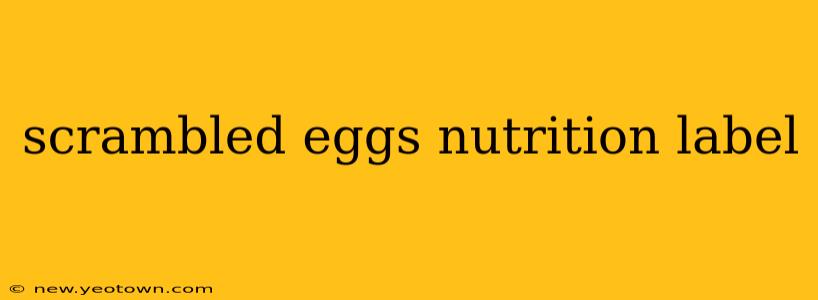Scrambled eggs—a breakfast staple, a quick lunch, or even a satisfying midnight snack. But beyond their delicious simplicity, what exactly is in this culinary chameleon? Let's unravel the nutritional secrets hidden within those fluffy, golden curds. This deep dive will explore the typical nutrition facts you'll find on a scrambled egg nutrition label and address some common questions people have about this versatile food. We’ll be focusing on a serving size of two large eggs scrambled without added butter or oil. However, keep in mind that nutritional values can slightly vary based on the size of the eggs, cooking methods, and any added ingredients.
What's on a Typical Scrambled Eggs Nutrition Label?
A standard nutrition label for two large scrambled eggs (cooked without added fat) will generally showcase the following key nutritional components:
- Calories: Around 140-160 calories. This can increase significantly if you add butter, oil, cheese, or other ingredients during cooking.
- Protein: A significant source, typically around 12-14 grams. This makes scrambled eggs a fantastic choice for those aiming to build and maintain muscle mass.
- Fat: Around 10-12 grams, predominantly unsaturated fats which are considered heart-healthy. Again, added fats during cooking will drastically alter this number.
- Cholesterol: This is often a point of concern. Two large eggs contain approximately 370mg of cholesterol. However, current dietary guidelines emphasize a more holistic approach to cholesterol intake and its impact on blood cholesterol levels. Individual responses vary significantly.
- Carbohydrates: Minimal, typically less than 1 gram. Scrambled eggs are considered a low-carb option, beneficial for those following low-carb diets.
- Vitamins and Minerals: Scrambled eggs are packed with essential nutrients including Vitamin D, Vitamin B12, choline, selenium, and iron.
Are Scrambled Eggs Healthy?
This is a question many people ask, and the answer is nuanced. In moderation, scrambled eggs can definitely be part of a healthy diet. Their high protein content supports muscle growth and satiety, helping you feel fuller for longer. They are also a good source of essential vitamins and minerals. However, the fat and cholesterol content should be considered within the context of your overall dietary intake. If you have high cholesterol, it's best to consult with your doctor or a registered dietitian about egg consumption.
How Many Calories Are in Scrambled Eggs?
As mentioned earlier, approximately 140-160 calories for two large eggs prepared without added fats. However, this can fluctuate. The addition of cheese, butter, cream, or other ingredients significantly increases the calorie count. A simple addition of a tablespoon of butter can add around 100 calories! Be mindful of your additions to maintain control over your calorie intake.
How Much Protein Is in Scrambled Eggs?
Two large scrambled eggs provide roughly 12-14 grams of high-quality protein. This protein is crucial for building and repairing tissues, supporting immune function, and maintaining overall health. This makes scrambled eggs an excellent choice for breakfast or a post-workout meal.
Are Scrambled Eggs Good for Weight Loss?
Scrambled eggs can be a valuable part of a weight-loss diet due to their high protein content, which keeps you feeling full and satisfied, potentially reducing overall calorie intake. However, mindful preparation is key. Avoiding added fats and high-calorie additions will help maintain a lower calorie count and support weight management goals.
What are the Health Benefits of Scrambled Eggs?
Beyond their nutrient profile, scrambled eggs offer various health benefits:
- Improved cognitive function: Choline, abundant in eggs, plays a crucial role in brain health and cognitive function.
- Stronger eyesight: The presence of lutein and zeaxanthin can help protect your eyes from age-related macular degeneration.
- Enhanced muscle growth: The high-quality protein aids in muscle repair and growth, making them beneficial for athletes and fitness enthusiasts.
In conclusion, the scrambled egg nutrition label provides a snapshot of a nutritional powerhouse. While the cholesterol content is often a concern, the overall nutritional benefits—particularly the protein and essential vitamins and minerals—make them a valuable addition to a balanced diet. As always, moderation and mindful preparation are key to reaping the rewards without exceeding your daily recommended intake of fats and calories.

